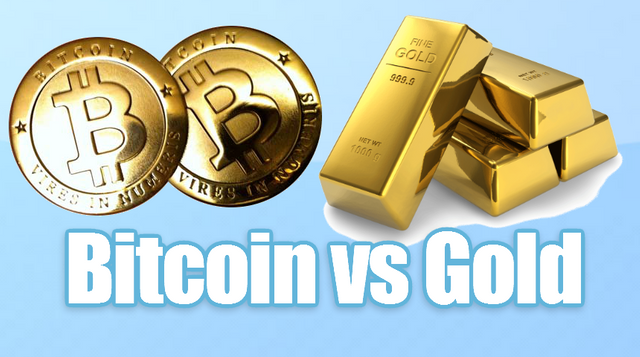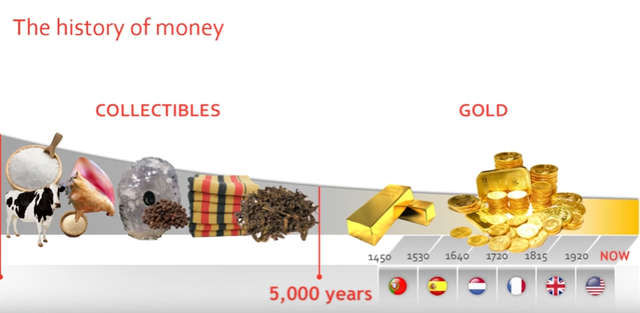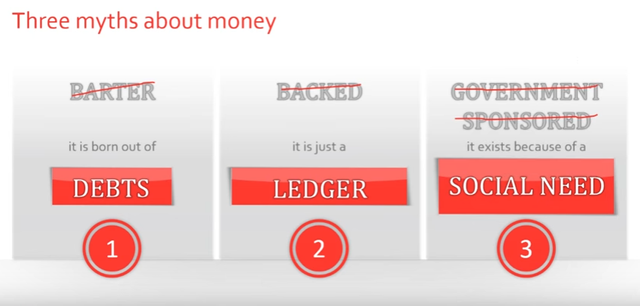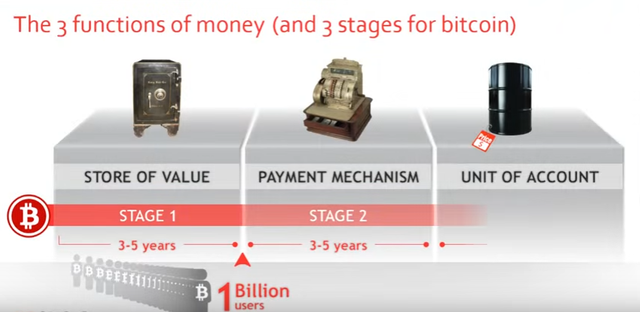Bitcoin Vs Gold - Why I Believe Bitcoin Will Pan Out To Be More Valueable Than Gold
I believe that Bitcoin may become more valuable than gold in both value and utility as time progresses and its adoption grows.

In Spain, they have a saying that goes something like this.
When the genius points to the moon, the fool looks at the finger.
I think that saying applies quite appropriately to how many people think of Bitcoin.
When someone hears about Bitcoin for the first time they tend to focus on one of its features. Either the cryptography of bitcoin or it may be that they're interested in the mining of bitcoin or even who the mysterious creator is, Satoshi Nakamoto.
All of these very interesting features are incredibly attractive and we gravitate to them too quickly, missing the bigger picture of why Bitcoin matters.
Why Bitcoin Matters
I think Bitcoin matters because it may be the best form of money that we have ever seen. It may not be easy for some to notice that because it's still early in its development.
Bitcoin may do for money what TCPIP (Transmission Control Protocol/Internet Protocol) did for information.
TCP/IP (Transmission Control Protocol/Internet Protocol) is the basic communication language or protocol of the Internet. It can also be used as a communications protocol in a private network (either an intranet or an extranet)
Bitcoin today is like TCPIP was in 1992 before there was a browser on the internet and it took a lot of imagination back then to understand how the internet might change the world.
The first way to understand bitcoin, I think, is to understand the history of money and the role of money.
Anthropologists say that there's no evidence of any tribe, much less a civilization, that ever used barter for trade and that should be quite counter-intuitive to most of us because we're taught in school that we first bartered and then we invented money because bartering was too hard.
Well, that's not true. That never happened.
From about 100,000 years ago to about 25,000 years ago, the way we did trade was that everybody in our tribe would know that so and so killed a big buffalo and I would come up to you and say, "Hey, you're not going to eat that whole buffalo. Can I have a little bit of meat."
They would decide if they wanted to give me some meat or not and other members of the tribe would come and ask them for some meat and they would decide who to give meat to or not and they would have to remember who they gave meat to because they hoped that they would repay them back somehow, sometime in the future.
It was a very subjective system, but that's how trading worked. We all walked around with these subjective ledgers in our mind of who owes us what and hopefully those people eventually repaid us with something that felt fair to us.
As subjective as that system was, we used it for a very long time, for 75,000 years at least, longer than any other system until someone very intelligent in our tribe came up with a new technology, an innovation.
For example, they may have said, "Hey, everybody knows you have a lot of firewood. Can I have some of your firewood?" But this time we're going to pay for it with a new technology. Here are some beads for you.
The man with the firewood responded, "I don't need beads."
"I know you don't need beads but we're going to use these beads to keep track of the debt we owe so we don't have to keep track of it in our heads subjectively anymore", said the buyer, "You just keep the beads and that will be how much you're owed."
It was such a successful technology that it just took off and very quickly, in a couple thousand years, it's impossible to find a tribe or civilization that doesn't have some form of objective ledger.

Some tribes chose salt, others chose rocks, seashells, and different forms to keep track of debts in their societies.
Anthropology goes as far as saying that if you describe to them the environment of a tribe, they can easily predict what's going to become a ledger in that tribe because the most important quality of that object will be its scarcity.
That makes sense because if we're going to use something to keep track of debts and it's not scarce, like a leaf on a tree, one could simply pick leaves and create fake debt to benefit oneself at the expense of everybody else.
So scarcity is the most important attribute of this thing to keep track of debt. In fact, there are five attributes that are very important for something to be a good candidate as a currency.
- Durability - it doesn't decay or corrode
- Transportable - easy to carry around
- Divisible - capable of being divided
- Recognizable - able to be recognized or identified from previous encounters or knowledge
- Fungible - able to replace or be replaced by another identical item; mutually interchangeable
This system took off and worked really well from about 20,000 years ago to about 5,000 years ago.
5,000 years ago tribes began to trade with other tribes and they needed something in common to trade with. One tribe had beads and another tribe had seashells and they couldn't trade and that's when gold emerged as the first universal ledger that could be used by all tribes.
Gold was universally scarce, but it was also transportable. divisible, recognizable and fungible.
In this short post of the history of money, I want to illustrate three myths. If you believe in any of these three myths, it's very difficult to understand the function of money and why Bitcoin matters.
The first myth is that money was born out of barter, when actually, it was born out of the need to keep track of debt.
The second and perhaps biggest myth is that money is backed by something, when actually, money has never been and will never be backed by anything. It's just a ledger.
People will often tell you that the dollar used to be backed by something, gold. Right now it's not backed by anything, but it used to be gold. But in truth, that implies that gold is backed by something or has some intrinsic value. Gold doesn't have any intrinsic value beyond being a great ledger and very scarce and durable.
We use it for jewelry because of that scarcity and it represents wealth and power and not just because it's pretty.
This is a very common misunderstanding about money, but it's just a ledger, it's not backed by anything.
The third myth is that money exists because it's created and sponsored by governments when in truth, it's been around a lot longer than governments have been around and it will be around as long as there are social interactions. It fulfills a very basic social need.
From where we're standing today it's very hard to understand the importance of gold because right now the universal ledger is not gold, it's the US dollar and before that, for about 500 years, we've had various reserve currencies.
Most recently, the Portuguese escudo, then the Spanish dollar or "pieces of eight", the French franc, the Dutch guilder and then the British pound and now the US dollar.
All of them have been the universal ledger, the reserve currencies, for about 100 years, but none of them have been anywhere as near as good as keeping their value as gold has.

If you had $100 USD in the 1800's and you saved it as $100 USD, back then it would have represented as much as a year of someone's yearly income and today it's just $100. If you would have spent that $100 on gold back then, you would have the same value or roughly the equivalent value of a person's yearly income today.
We know of nothing else that is so good at keeping value other than gold. It's quite incredible that the best ledger we have ever found is such a primitive thing that takes billions of dollars to dig it out of the ground and then we lock it in vaults underground again.
With all the technology we have today. gold remains the only one ledger that we can all use where we're not trusting a government, a person or a bank or company, we're just trusting something really scarce.
About 8 years ago in 2009, Bitcoin was created and it's a universal ledger that serves as digital money in a way in which, just like gold, you don't have to trust anyone. No person, company, bank, or government.
When you compare Bitcoin to gold, it's incredibly superior in each one of these aspects; scarcity, divisibility, portable, durable, recognizable and fungible. It's superior not by just a little bit, but by a lot.
It's the first time in the last 5,000 years we've had anything that is immensely superior to gold and what makes it so much better than gold is that there will never be more than 21 million Bitcions, period. It's mathematically perfect scarcity. You can trust it.
As with Bitcoin, we mine more gold every year, about 2000 tons a year.
In terms of the divisibility, bitcoin is composed of a million pieces called bits, so a million bits are one bitcoin making it easily divisible.
The portability is also very important, Up until now, if you want to do a transaction with anyone with a dollar or a gold coin, you can easily walk up to them, hand them a dollar and you have completed the transaction without any third party involvement, but the moment you want to do a transaction with someone who's not in the room, we always need a third party.
That has been the case forever. That's how banks got started and today we have things like credit cards, PayPal, etc. It's just been impossible to do a transaction with someone else over a distance without both of us trusting a third party, a middle man.
What is remarkable about Bitcoin is that it allows us to do a transaction with anyone else on the planet, even if you don't know them, in real-time, for free, without any third party and without any added trust.
Think about that for a second. We can call someone right now in Hong Kong on Skype, we can hear them, see them and communicate with them live, but if we wanted to send them 1 cent, it just wasn't possible. The few ways we've had to send someone 1 cent across the world would cost so much and take so long it would not be worth the effort.
With bitcoin you can move a cent or a billion dollars just as quickly and just as cheaply. It's the first time in 5,000 years that we have something immensely superior to any form of money we have seen until now.
The three functions of money when money works well is:
- Store of value - a way of saving
- Payment mechanism - a way of paying
- Unit of account - a way of pricing

I think these are the ways that Bitcoin is going to develop. Most people that have Bitcoin today are using it as a way of saving. They're not using it for paying so much. In 2014 only about 7 million people were using Bitcoin so there were not many people you can transact with, but the numbers of people using it are growing exponentially.
Most of those people are using bitcoin because they believe in bitcoin and they want to save it. I think the good thing about the saving function of bitcoin is that if you want to buy some bitcoin, you don't need anyone's permission to accept it. You just buy some bitcoin and hold them.
For Bitcoin or any other cryptocurrncy to be used for payment, a lot of people need to accept it. I think that once we have enough people that have bitcoin for other reasons, it will become an improved, payment mechanism and if it's used enough as a payment mechanism, it's only natural that it also becomes a way to price things.
Since its launch date in 2009, Bitcoin didn't gain a lot of traction until 2011 and more people are using it every day and it's one of the most important social experiments going on right now and I think it matters because there is a good chance that over the next 20 years, we finally, after 5,000 years can replace the trust of the gold standard with a completely new standard, the Bitcoin standard.
This may not, and possibly should not, replace any national currencies, but it's likely to become the native, international currency of the internet and will mark the biggest leap forward in the democratization of money.
Related posts
How Blockchain Technology Can Help The Internet Of Things
Programmable Trust For The Internet Of Things How Bitcoin Is Transforming The Way We Do Business
Bitcoin Vs Banks Technological Disruption Can Revolutionize Banking
Five Ways Smart Contracts On A Blockchain Are Changing The Way We Do Business
Blockchain Is Killing The Middleman Real Trust In A Virtual World
Today I Learned More About Bitcoin And Blockchain Technology

Hello, my friend @luzcypher, I find your article here quite interesting, but I feel a need to "weigh in" with you and express a couple of minor differences of opinion... No offense intended, whatsoever! I am in complete agreement with your title and premise! But, as they often say, the devil is in the details! You said:
This is certainly remarkable, and almost true... however, "without any third party" is true if you understand that there actually are thousands of third parties, all of them requiring internet connections. And, "without any added trust" is true if you understand that you are trusting that the Chinese will not pull the power plug on the majority of miners who make blockchain transactions possible. This is a risk that @dantheman pointed out recently in this article.
Finally, the promise of transactions "in real-time, for free" is presently not exactly the case, unless one is willing to amp up the transaction fee they are willing to pay. This is a problem inherent in the design of the bitcoin blockchain and algorithms, and it will only grow unless there is some fundamental re-working done - i.e. a universally agreed upon "hard-fork" of some kind.
FYI, I both hold (as much as possible, due to Gresham's Law!) and transact with Bitcoin (as needed) because of its quite wonderful properties that you have described.
Now for a disclaimer; I am not nor do I profess to be any kind of "expert" on Bitcoin; but I simply wanted to mention these issues for folk who read your valuable article so that they have a little balance in their understanding.
Thank you for your fine article!😄😇😄😇

Your points are well made and kindly noted. Relative to traditional means of transferring money, bitcoin is almost free and yes, we are trusting "thousands of third parties" rather than a central third party which I believe increases accountability.
I appreciate your gracious response to my comments! ;)
Likewise, and thanks for taking time to read and comment
FOr most of the 1800s, if you had $100, it was made of gold. or silver. The first greenbacks didnt roll off the presses until i think 1867.
that said, youre one of the first crypto people ive met that has understood this:
People think the current dollar is somehow worse than the gold-backed dollar, but at the end of the day, its all a ledger. We used to keep the ledger with gold, but now we keep it with computers in the federal reserve.
however, here youre a little off. Its not incredible at all that we have to dig it out of the ground.
Think for a moment. Where does the power to keep the ledger in BTC come from? From proof of work. They like to say that gold is a useful monetary standard because its scarce, but just being scarce isnt enough. Getting it has to take work...
Agreed and you make a good point. Work is the real value and all this types of ledgers are representations of the value of someone's work.
This post has been ranked within the top 80 most undervalued posts in the first half of Dec 16. We estimate that this post is undervalued by $4.37 as compared to a scenario in which every voter had an equal say.
See the full rankings and details in The Daily Tribune: Dec 16 - Part I. You can also read about some of our methodology, data analysis and technical details in our initial post.
If you are the author and would prefer not to receive these comments, simply reply "Stop" to this comment.
Everyday I see Bitcoin as having more potential than Gold, having greater security and absolutely more mobility. I imagine it will become the next international go to... hopefully not before I acquire some more.
As long as the numbers of people who are using it continue to grow, I believe you're correct.
Great article!!
As I read, I kept thinking, "We've really drank the cool-aid if we denominate everything in the paper empty promises of the Fed". We have and we do.
Then I thought, "Why shouldn't bitcoin be denominated in gold?" It makes more sense. One BTC is currently worth about .65 oz of gold (off the top of my head, so not quite accurate).
As an interesting aside - BTC is the closest thing we've ever had to fiat money (as opposed to fiat currency). It fits the Aristotelian definition of money except in one area, inherent value, where it half fits it (the Aristotelian definition included, Durable, Portable, Divisible and Inherent value - Some say "intrinsic", but economists argue that the only intrinsic value is life itself, to which I'd agree). Durability could be argued too. Gold is always gold. If you lose it, someone can dig it up and it's still gold. If you lose your hard drive, someone can dig it up and won't be able to do a thing with it.
I'm with you, and think it'll outpace gold. When we see 1 BTC = 1 OZ AU, it'll be a glorious thing. Does that mean we can look forward to 1 ETH = 1 OZ AG?
The fed and BTC denominate money in the same way -- with an electronic ledger. The only difference is that the ledger is decentralized in btc. Dollars aren't made out of paper.
The same "way", but not the same "thing" at all.
ever heard of goldmoney.com ??
Hi, I'm also like @creatr, found your article really interesting but have to weigh in also, about a different aspect of your article, the anthropological evidence for the origin of money. I'd be interested to see what your references are for this point of view, or influences at least. So my critique is in the spirit of friendly debate, just so you know! 😇
While I agree that the money origin story of barter is unfounded, and it is based on debt, some of what you say sounds like another kind of myth. No smart person ever invented money and it just caught on. From what I understand, the origin of money is in tracking the debts of unfree people, who worked for temple complexes, starting in Mesopotamia, which were the first densely populated areas in the world (that we know of). These were always tracked using various kinds of ledgers, from simply cutting marks in sticks (remember these people were largely innumerate) to clay tablets. Before this, we had a kind of communal living where things are shared, which has never stopped being the main way that the necessities of life are made available to people. For example, in the primordial tribe you mention, and the clan, family, etc.
What you're actually taking about with coins and tokens are different kinds of currency, which are used to pay debts, and are a different way of organising debt. What I mean is that a currency system is not required for a money system. The actual physical item is not primarily scarce, it is primarily valuable. This is to say that it is highly valued by the people who use them within that society. Where gold is used, we find people wearing that gold to show social status. Where shells are used, we find them used to make dyes, jewellery, or involved in religious rituals.
But this is not universally the case, we can also buy and sell the debts themselves, and the form of this is always passing around the thing with which it is recorded. Bank notes are actually little pieces of debit, and in the UK still say "I promise to pay the bearer such and such", a statement from the head of whatever bank it is. They are IOUs.
This means that to say a currency is "backed" means that those debts can actually be paid, so if everyone in the country said they wanted the value of the debts they have to be paid in whatever it is backed by, that it could be actually be paid. It's more complicated than that of course, but that's the gist. For example, in the UK the banks were founded by an initial loan from the king, which was never and can never be paid, or there'd be no money. But it's not in anyone's interest to do that anyway.
Another aspect I disagree with is that markets exist independent of the state. One of the rights the sovereign takes (be it king or government) is to set what people are allowed to use as currency, which since large scale warfare has always been intrinsically tied to what one can use to pay taxes. There was some time in the US where tobacco leaves was allowed to be used as currency I think, but I can't remember if this is totally true 😅 Anyway this is one of the reasons why cryptocurrencies are so interesting, they are not used to pay taxes and purely stand in as a way of managing debts between people, but yet are not controlled by a central authority, which currencies have always been. However, I think those debts essentially are backed by real world currency, since they can be cashed out into it. But I might be wrong about that last point 😜 Not only that, they seem to be controlled not by a central authority, but by a distributed one.
Anyway I think I've gone on long enough :D Again, enjoyed your article and I'd be interested to hear you response if you like. My source for most of this is Debt: The First 5,000 Years by David Greaber, a very interesting read for those of us who don't have an anthropology PHD. I'd recommend it highly.
Holy shit, that was an amazing post @luzcypher!! That's some valueable info